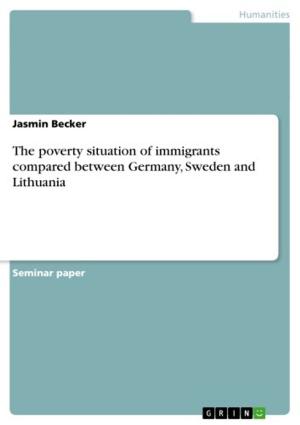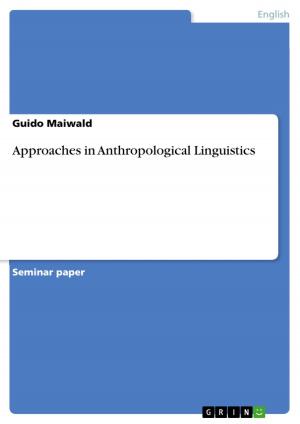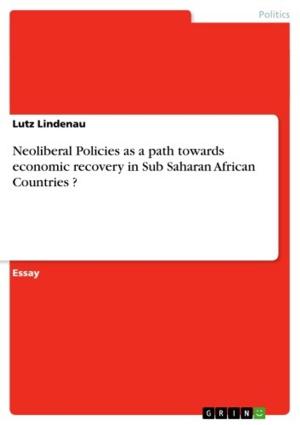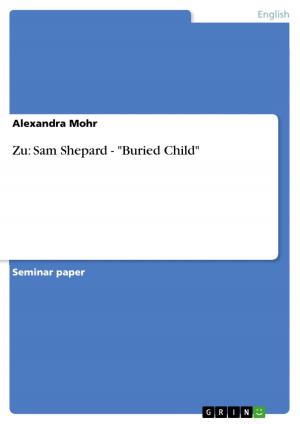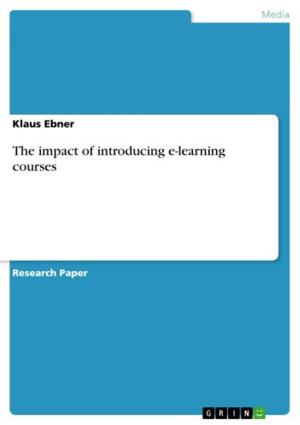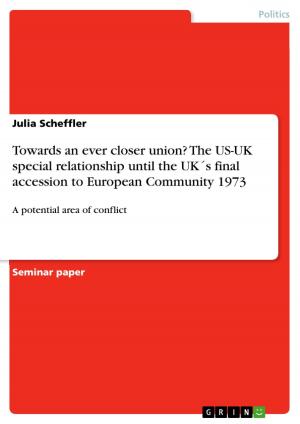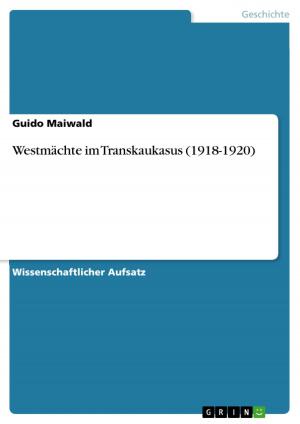How valid is it to say that Englishness is contained within Britishness?
Nonfiction, Reference & Language, Study Aids, ESL, Foreign Languages| Author: | Tobias Rösch | ISBN: | 9783640105922 |
| Publisher: | GRIN Publishing | Publication: | July 17, 2008 |
| Imprint: | GRIN Publishing | Language: | English |
| Author: | Tobias Rösch |
| ISBN: | 9783640105922 |
| Publisher: | GRIN Publishing |
| Publication: | July 17, 2008 |
| Imprint: | GRIN Publishing |
| Language: | English |
Seminar paper from the year 2007 in the subject English Language and Literature Studies - Culture and Applied Geography, grade: 1.0, University of Freiburg, course: Proseminar Contemporary Britain, 15 entries in the bibliography, language: English, abstract: While Scotland and Wales slowly dissociate from a community that had served its purpose in times of crisis (among them World War I and II, and, more recently, the Falkland War of 1982) as well as in the global context of the British Empire, England is left with a dilemma: Before the backdrop of a potential division of Britain, how can the English reinvent themselves and find their own specific identity? This paper will be concerned with English identity and shed some light on the question of whether or not we can speak of Britishness as incorporating a specific notion of Englishness. When in 1997 a majority of the Scottish public voted in favour of forming a Scottish Parliament endowed with its own (limited) legislative competence, it became increasingly clear that Britain would undergo a process of national transformation in the years to come that would change the country irrevocably. The shadow of devolution had fallen over what has always been the political and economic pivot of the Union: Looming in a distance could be discerned the first harrowing signs of a disintegration that would gradually weaken national cohesion within Britain and sever the bonds that had held the nation together for more than three centuries. In 1707 the Kingdom of Scotland had been married to the Kingdom of England by parliamentary acts that came to be known as the Acts of Union; historically, however, both countries had been ruled by a single monarch ever since the Union of the Crowns, dating back to 1603. Nowadays, the debate about national sovereignty is being rehashed; to many people, especially those living in the English regions, and among them a considerable number of politicians, the drastic developments are more than just a nuisance. While Scotland and Wales slowly dissociate from a community that had served its purpose in times of crisis (among them World War I and II, and, more recently, the Falkland War of 1982) as well as in the global context of the British Empire, England is left with a dilemma: Before the backdrop of a potential division of Britain, how can the English reinvent themselves and find their own specific identity?
Seminar paper from the year 2007 in the subject English Language and Literature Studies - Culture and Applied Geography, grade: 1.0, University of Freiburg, course: Proseminar Contemporary Britain, 15 entries in the bibliography, language: English, abstract: While Scotland and Wales slowly dissociate from a community that had served its purpose in times of crisis (among them World War I and II, and, more recently, the Falkland War of 1982) as well as in the global context of the British Empire, England is left with a dilemma: Before the backdrop of a potential division of Britain, how can the English reinvent themselves and find their own specific identity? This paper will be concerned with English identity and shed some light on the question of whether or not we can speak of Britishness as incorporating a specific notion of Englishness. When in 1997 a majority of the Scottish public voted in favour of forming a Scottish Parliament endowed with its own (limited) legislative competence, it became increasingly clear that Britain would undergo a process of national transformation in the years to come that would change the country irrevocably. The shadow of devolution had fallen over what has always been the political and economic pivot of the Union: Looming in a distance could be discerned the first harrowing signs of a disintegration that would gradually weaken national cohesion within Britain and sever the bonds that had held the nation together for more than three centuries. In 1707 the Kingdom of Scotland had been married to the Kingdom of England by parliamentary acts that came to be known as the Acts of Union; historically, however, both countries had been ruled by a single monarch ever since the Union of the Crowns, dating back to 1603. Nowadays, the debate about national sovereignty is being rehashed; to many people, especially those living in the English regions, and among them a considerable number of politicians, the drastic developments are more than just a nuisance. While Scotland and Wales slowly dissociate from a community that had served its purpose in times of crisis (among them World War I and II, and, more recently, the Falkland War of 1982) as well as in the global context of the British Empire, England is left with a dilemma: Before the backdrop of a potential division of Britain, how can the English reinvent themselves and find their own specific identity?



